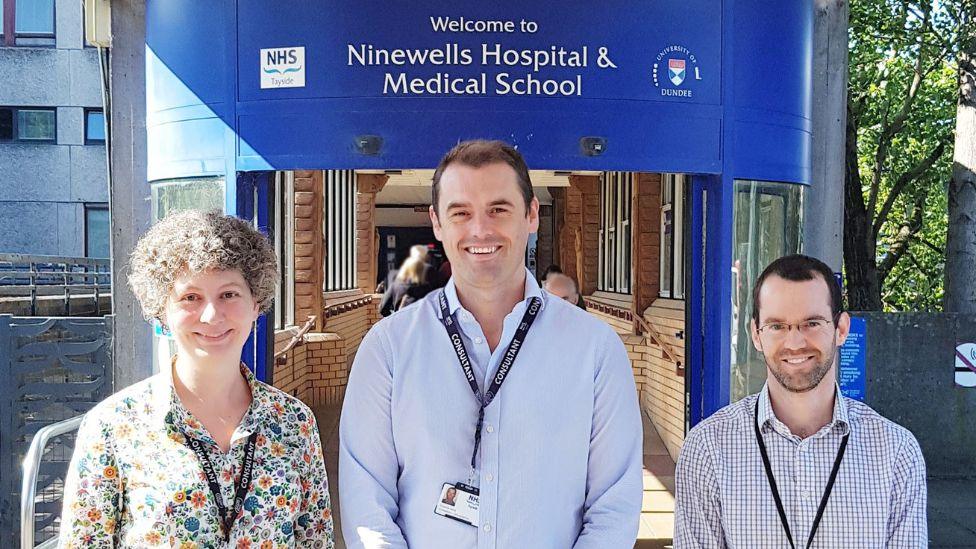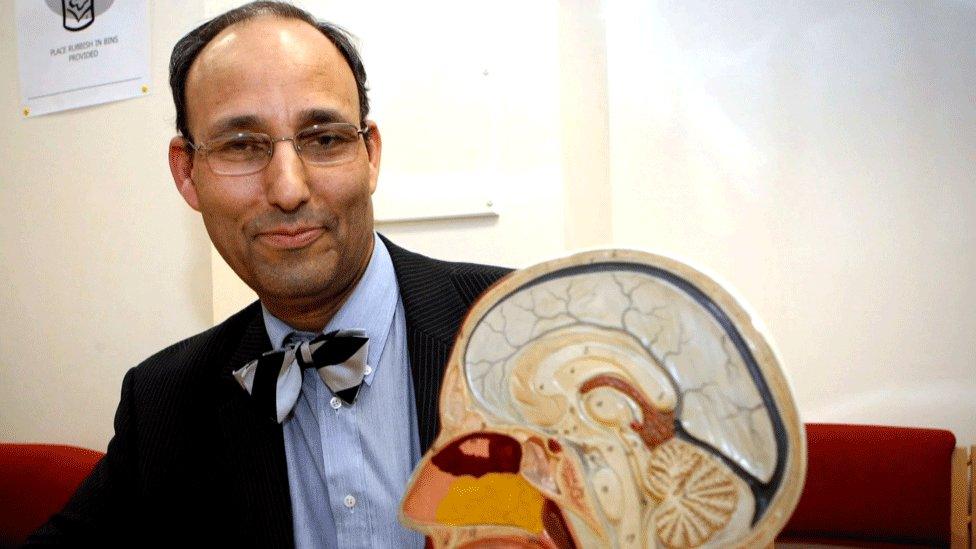Hopes phage therapy can offer patient lifeline
- Published

Mr Graeme Nicol, centre, carried out the procedure at Ninewells Hospital in Dundee with support from Dr Daniela Munteanu and Dr Josh Jones
Scottish surgeons have become the first in the UK to use a more than 100-year-old method to successfully treat a joint infection.
It is hoped the breakthrough can help to provide a lifeline to patients with antibiotic-resistant conditions.
NHS Tayside says its orthopaedic unit in Dundee is the UK's first to treat a joint infection using phage therapy.
It involved applying specially selected viruses, called phages, to kill bacteria.
The treatment was used on an 84-year-old woman at Ninewells Hospital.
Suffering a badly infected hip and pelvis, she had gone through eight operations to cut out the infection, as well as a year and a half of antibiotic therapy.
Within two weeks of the phage treatment her infection had cleared. Her wound had healed for the first time since Christmas and the patient was set to return home within eight weeks of the therapy.
The procedure was carried out by consultant trauma and orthopaedic surgeon Mr Graeme Nicol with support from the UK's only clinical phage specialist, Dr Josh Jones, and infectious disease consultant Dr Daniela Munteanu.
"What the virus does, it attaches to the cell of the bacteria, it infiltrates it and it multiplies," Mr Nicol told BBC Scotland. "In doing that, it causes the bacteria itself to burst.
"So in other words, it just destroys the bacteria that is there – phage comes from the Greek devour so it works its way through this infection clearing it out of the body."

Specialists at Ninewells Hospital in Dundee hope their unit can be used as a UK-wide hub for phage therapy
Once the infection is treated, the phages are destroyed by the patient's immune system.
The patient remained on anti-biotics throughout the process, Mr Nicol told BBC Scotland.
The surgeon said as well as being used on hip infections, the treatment could work on knees, ulcers, bladders and other areas where phages can be directly applied.
The therapy was first developed in 1919 and widely used in the early 20th century, particularly in the US where it was commonly used on cholera.
But following the discovery of penicillin by Scot Alexander Fleming in 1928, the use of phages declined in western nations because they are harder to manufacture and store than antibiotics.
'Lifeline'
Mr Nicol stressed that while phage therapy is not a replacement for antibiotics, it could be a "lifeline" for patients with antibiotic-resistant infections.
The UK Health Security Agency has warned of a "hidden pandemic" of antibiotic-resistant infections, while the World Health Organization has described them as one of the biggest threats to global health.
Mr Nicol said such cases were a "daily occurrence" in NHS Tayside. "We have patients that are stuck in hospital receiving intravenous antibiotics because there is no longer an oral option because the resistance is built up to such an extent that even more common infections are now becoming more resistant to antibiotics," he told BBC Scotland.
The surgeon said he hoped to see the phage therapy rolled out across the UK within the next two years, with NHS Tayside producing bespoke treatments for patients with severe infections.
"The patient doesn't have to travel here to get the treatment," Mr Nicol said. "That's a beauty of it.
"Every centre has their own microbiology and infectious disease unit and they will be able to look at it and tell us exactly which bacteria it is.
"From that point, the lab here can just simply look along and see if we have a virus that kills that bacteria. And then we can just ship it straight to them."
He said the "labour intensive" process – which involves finding suitable viruses in the environment and multiplying them in a laboratory – would require further investment to be expanded across the UK, but could be streamlined as it is developed.
Related topics
- Published17 November 2021

- Published20 April 2023
